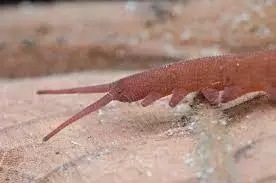
Half-billion-year-old sea fossil hints at new ideas on brain evolution
text_fieldsPic: Velvet worms
Scientists are questioning what they know about brain evolution after finding the fossils of a small sea creature that died over half a billion years ago. The worm-like animal has the oldest fossilised brain ever discovered.
The study on the 1.5 cm long fossil belongs to a creature called Cardiodictyon catenulum. It has a delicately preserved nervous system which includes a brain. The sea animal belongs to an extinct group of animals known as armoured lobopodians. They were common in the Cambrian period which is when all major animal lineages appeared. The closest living relatives of lobopodians are velvet worms found in Australia, New Zealand, and South America.
According to experts, the fossil shows an unexpected anatomy. It has a segmented trunk and repeating arrangements of neural structures known as ganglia. But its head and brain have no signs of segmentation, which is a structure found in modern arthropods and some of their fossilised ancestors.
This discovery contributes greatly to the debate about the origin and composition of the head in arthropods which include insects, crustaceans, spiders, millipedes, and centipedes.
"From the 1880s, biologists noted the clearly segmented appearance of the trunk typical for arthropods, and basically extrapolated that to the head. But Cardiodictyon shows that the early head wasn't segmented, nor was its brain, which suggests the brain and the trunk nervous system likely evolved separately," said the study published in the journal Science.






















